Joy Neal Kidney's Blog, page 85
July 29, 2020
You Are Not Forgotten
The Book
[image error]
Major George Eyster V comes from a family of military officers dating back to the Revolutionary War. His tour of duty in Iraq, however, left him disillusioned and questioning. Then he accepted a posting to J-PAC, an elite division whose mission is to fulfill the most solemn promise of the military code: bring all fallen soldiers home to the country for which they gave their lives.
In 1944 Captain Ryan McCown, a dashing young Marine aviator assigned to the USS Nassau, was shot down over the jungles of Papua, New Guinea. McCown’s diaries and letters home provide a powerful portrait of the fears and sacrifices of a very different war—and the pathos of the ultimate cost of duty.
Eyster’s mission with J-PAC eventually took him and his team deep into the sweltering interior of New Guinea to at last deliver this fallen veteran to his loved ones—while perhaps also recovering something lost in himself.
The Author
Bryan Bender is the national security reporter for The Boston Globe and president of the Military Reporters and Editors Association. He has covered U.S. military operations in the Middle East, Asia, Latin America, and the Balkans. He also writes about terrorism, the international arms trade, and government secrecy.
My Thoughts
George Senseny Eyster, five generations of them, seven generations of soldiers. The youngest generation, the grandson of a Lt. Colonel who was Vietnam casualty, son of yet a another Lt. Colonel, where he fit into such expectations. George V served in Iraq and almost gave up an army career, but was given a chance to serve with the Joint POW/MIA Accounting Command (JPAC).
The rest of the book was fascinating, especially since one of my uncles is still missing from WWII, with the rest of the crew of a B-25 off New Guinea, and I’d read about the care given when doing excavations through the decades since the war. Eyster not only led work in Vietnam, he was introduced to the Vietnamese officer who commanded the troops who killed his own grandfather.
The most compelling part of the story was the chapter called “Rediscovery,” walking the reader through the difficulties of taking a crew into the challenges of New Guinea (physically with the jungle, but also with nuancing native sensibilities about the land and getting paid), and the care with which the remains of fallen Americans are shown. Where “every day is Memorial Day.”
This generation of George Eysters found his very satisfying role in leading the return of remains to an American family who had been lost for decades. What a legacy.
July 27, 2020
Bless This House
My mother loved this prayer. A copy of it hung on the south wall of the “front room” in the our farm house during the 1950s. I can still hear Perry Como singing it.
Bless this house, O Lord we pray,
Make it safe by night and day . . .
Bless these walls so firm and stout,
Keeping want and trouble out . . .
Bless the roof and chimneys tall,
Let thy peace lie overall . . .
Bless this door that it may prove,
Ever open,
To joy and love . . .
Bless these windows shining bright,
Letting in God’s Heavenly light,
Bless the hearth, ablazing there,
With smoke ascending like a prayer!
Bless the people here within,
Keep them pure and free from sin . . .
Bless us all that we may be,
Fit O Lord to dwell with thee . . .
Bless us all that one day we may dwell,
O Lord! With Thee!
(Words and Music by Helen Taylor
and May H. Morgan ( a.k.a. Brahe ), 1927)
Do you remember something unusual on the walls of your childhood home?
July 24, 2020
Girl Scouts, Dexter, Iowa–1933
But when it was time to graduate to Girl Scouts, we girls in the country were expected to join 4-H instead. But the town girls joined Girl Scouts, and I understand that they were such a close-knit group that they still have reunions.
1930s
Back in the 1930s, Della Gowdy, phys ed and social studies teacher, and Genora Cushman, who taught Sunday School (Methodist?) and collected news for the paper, were the Girl Scouts leaders. There weren’t any uniforms and no badges, just camaraderie and learning some skills
[image error]Della Gowdy
Doris Wilson (toward the end of her freshman year) remembered camping out in May of 1933 in the old Dance Pavilion at Dexfield Park, which was officially closed. During the night, they were wakened by walnuts thumping onto the roof and rolling to the ground.The girls picked Dutchman’s Breeches and Sweet Williams for May Baskets to deliver to elderly Dexterites.
Bonnie and Clyde
That July, they were again camping at Dexfield Park. Maxine Schell remembered that one morning the group took a long hike and came upon some people at a campsite, waved, and greeted them. Later they learned they’d encountered the Barrow Gang, AKA Bonnie and Clyde, who were holed up in the park so that Buck Barrow could recover from head wounds from a Missouri shootout. The historic Dexfield Park shootout, resulting in the escape of Bonnie and Clyde and their driver, and the arrest of Buck and Blanche Barrow, took place July 24, 1933.
[image error]
Meteor Shower
Della Gowdy lived just east of town with her father and blind brother (who lost his sight after falling from a horse). She hosted a campout of 16-20 girls on their front lawn that August. They were awake much of the night, mesmerized at the number and colors in a meteor shower–the marvelous Perseids.
Bovines
They also camped out in pasture northwest of town. Each girl was assigned to bring something to contribute to meals. Doris Wilson was to bring six potatoes, to add to eggs and bacon, etc., for breakfast. During the night the girls were scared by threatening noises from “a bull.” They woke Della and all ran across the field to cross a fence. It turned out that local cows were just curious about who was camping in their field.
They were far enough out of town for that campout that someone’s brother drove out to get the group. Della and the girls piled into and on the car. Doris and another girl rode on the running board, holding onto the car frame through a window, while two other girls rode on the other side.
Times sure have changed.
July 22, 2020
The Lincoln Highway: Main Street Across America
Text and photographs by Drake Hokanson.
The Book
Ten years after its original publication, Drake Hokanson’s best-selling book continues to inspire readers to leave the interstate for a road less traveled, but one that still fuels the American preoccupation with the open road.
In his new introduction to this tenth anniversary edition, Hokanson revisits the Lincoln Highway and finds it changed—much for the better—since the original publication of this book. Most notably, he calls attention to the reinvigorated Lincoln Highway Association and its efforts to preserve what is left of the old road. Hokanson finds more and more tourists traveling the road—not only Americans but foreigners as well—by car, bus, and motorcycle on journeys not to any particular destination, but simply to see America.
The Author
[image error]
Drake Anthony Hokanson is a photographer, writer and editor. He is mostly known for his black and white photographs in which he shows highways, small towns, landscapes, grain elevators, the Mississippi River, and the people who call American places home.
My Thoughts
In revisiting my own library for background reading for writing about Leora Goff Wilson’s stories before WWII, I came across The Lincoln Highway, written by the instructor of two summer workshops I took at the U. of Iowa when I was learning to write. He’d even autographed it, but I’d never read the entire thing.
[image error]
The book is an exciting history of one of the first main roads to cross the entire continent, capturing the dream as well as the drudgery. Heated arguments about which route each individual section would take took place in nearly every state crossed, especially since each had groups if influence with their own agendas.
In 1915, Henry B. Joy, president of Packard and who’d made yearly trips to the west, drove from New York City to the Panama Pacific Exposition in time for his automobile to be on “muddy display” in the Palace of Transportation. By then, the route finally chosen was marked as the Lincoln Highway, even though parts were mudholes.
I was shocked at Iowa’s infamous reputation as having some of the muddiest and worst roads of the entire route. Most of the Lincoln Highway in Iowa is now part of Highway 30 which goes right through Glidden where my husband grew up.
Compelling black and white photos accompany the very thorough history of this iconic American highway, named for President Abraham Lincoln.
It even includes a quote by Mr. Toad from The Wind and the Willows when he first encounters an automobile.
I especially enjoyed Drake Hokanson’s description of the Model T: “The Model T was an plain as a workboot, as spendthrift as a farm wife with her egg money, as hardworking as a threshing crew, and occasionally, when the weather was damp and affected the ignition timer, as unpredictable as any Missouri mule. It was cheap to buy and cheaper still to operate.
“When first introduced in 1908 the open touring model sold for $850, a fine bargain, but by 1926 the price had plummeted to $290–electric starter and demountable rims extra, of course. . . . this car would go farther on a nickel’s worth of gas and a dime’s worth of parts than anything else on the road. . . . Parts were available at thousands of Ford dealers; it was the only car Ford made, and all Model Ts shared the same basic chassis, engine, and drive train.”
July 20, 2020
Leora’s Pa (Sherd Goff) Dies, July 20, 1930
Delbert and Donald, in their mid-teens and wearing bib overalls, just like their Grandpa Goff, got a ride to the Ralph Garland farm just west of Dexter to shock oats. Several other men also helped.
Grandpa Sherd, Leora’s father, got the boys the job and went along to demonstrate how to cut and bundle the stalks.
After an hour or so, while Leora and some of the younger kids were picking green beans in their big garden, a black Model T drove up. Delbert and Donald got out. Delbert wiped tears as they walked up to the garden.
“Oh my, boys, what’s wrong? Did something happen to Pa?” Leora left her pail of beans.
“Yes, it’s Grandpa. We took a break for water.” Oat hulls dusted Donald’s shirt and overalls.
Delbert’s dark hair was chalky with field debris. “Oh Mom,” he said, “he took off his hat to wipe his head, not saying a word, ‘n’ just collapsed on the ground.”
“Boys, where is he now? I must be with Grandmother. Shake your pant legs and take these beans in the house for me, will you? I’ll be at Grandmother’s.”
Wiping sweat from her forehead with the hem of her apron, Leora hurried to her folks’ home nearby. She called for her mother as the back screen door to the kitchen creaked. She heard voices in the distance, through the house.
The eyes of Leora’s ancestors seemed to follow her through the living room from the large oval portraits on the wall.
Grandmother was at the front door, talking to a man in overalls on the porch. She turned, her hand to her mouth, with stricken eyes. “Oh, Leorie, Pa had a heart attack.”
Leora wrapped her mother in her arms, asking the man what he knew. He twisted his hat in his hands. “We were taking a break and Mr. Goff just collapsed.”
“Where is he now?”
“They took him to the doctor, Mrs. Wilson. That’s all I know. I’m so sorry, Mrs. Goff, Mrs. Wilson.”
Sherd Goff always worked a full day, although he’d felt poorly for several weeks. He’d even spanked his youngest grandchild, Junior, for picking and eating strawberries from the patch along the sidewalk. Leora had chided her father for scolding a four-year-old. Thirteen year old Doris asked her mother why Grandpa was so mean. “He’s just getting old and crotchety,” she said.
Leora’s brothers, Jennings and Merl, had been hauling gravel but someone took the news to them that their father had died of a heart attack. They got to town in time to help the undertaker bring the body into the Goff home along the highway in Dexter, where the funeral would be held.
“Oh Pa, Pa!” moaned Grandmother.
M.S. Goff Obituary
M.S. Goff Died Sunday From Heart Failure –
Had Not Been In Good Health For Many Weeks, But Death Was Sad Surprise
Sherd Goff died very suddenly last Sunday morning, following a heart attack which came upon him at the Ralph Garland farm just west of Dexter. Mr. Goff had gone to the Garland place to assist in shocking oats. He had labored but a short time when the attack came which caused his death. Mr. Garland discovered him unconscious in the field, placed him in an automobile and hurried him to Dexter, but life was extinct before the doctor’s office was reached.
Mr. Goff had enjoyed rugged health until a few months ago. Then an attack of flu with complications enfeebled his heart. For several weeks past he had not been so rugged in health as previously. He was an untiring worker, always engaged in some useful task. It was his natural industry which contributed to his untimely demise.
Mr. Goff was highly respected here, and enjoyed the fellowship of a host of friends. He was a kindly, considerate man, honest and upright. He will be deeply missed by all who knew him.
Milton Sheridan Goff, son of John B. and Florence [I.] Goff, was born July 26, 1865, in Madison County, Iowa. When seven years of age he went with his parents to Cass county near Atlantic where the family resided until he was sixteen years old. His parents next moved to a farm six miles south of Guthrie Center where he grew to manhood.
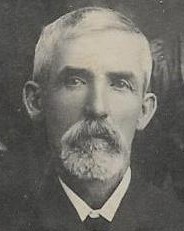
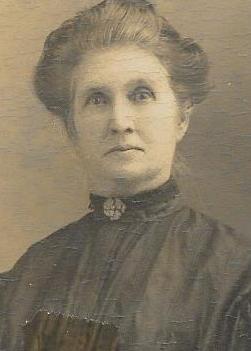
John Broderick and Florence Ione (Shepherd) Goff
On February 25, 1890, he was united in marriage to Miss Laura A. Jordan. To this union eleven children were born: Mrs. Leora Wilson of Dexter, Emery [Merl]of Dexter, Wayne of Pasadena, Calif., Georgia (deceased), Jennings of Dexter, Rolla of New York City, Mrs. Ruby B. Blockley of field Beach, Calif., Willis of Kansas City, Mo., Perry of New York City, Clarence of Omaha, Nebr., and Vernon (deceased).
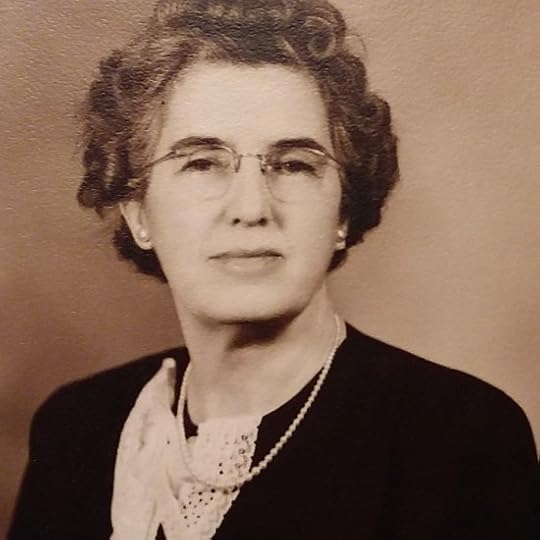
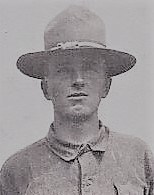
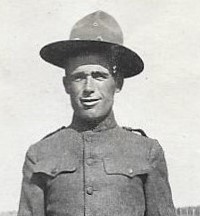
Leora Goff Wilson, Emery Merl Goff, Wayne Sheridan Goff
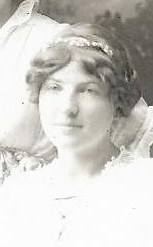
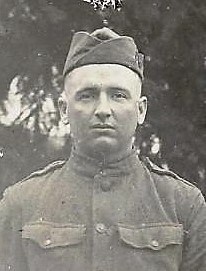

Georgia Laurayne Goff, Jennings Bryan Goff, Rolla Jordan Goff

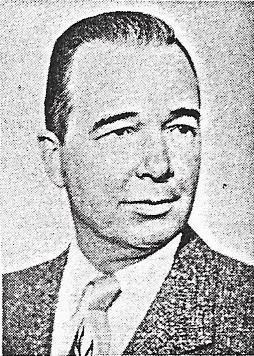
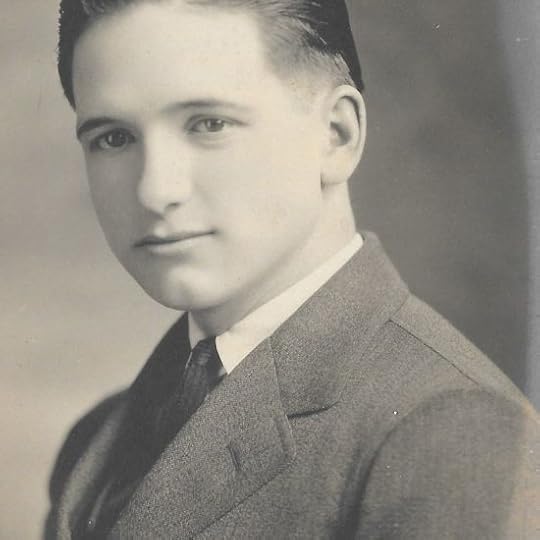
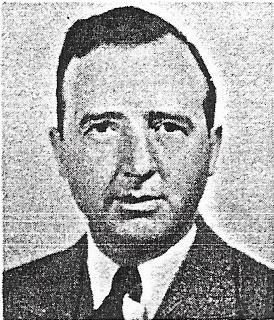
Ruby Belle (Goff) Blockley, Willis Walter Goff, Perry Alfred Goff, Clarence Zenas Goff
With the exception of four years residence in Nebraska and two years in Minnesota, Mr. Goff’s entire life had been spent in Iowa. For many years he lived on a farm near Guthrie Center. Leaving the farm he moved to Guthrie Center where he resided, with his family, until 1924, when they moved to Dexter, and here had been the family residence ever since.
For twenty-seven years Mr. Goff had been a member of the I.O.O.F. lodge at Guthrie Center.
He leaves to mourn his death his wife, nine children, eleven grandchildren, an aged mother and a brother, Ed, both of whom reside at Miles City, Mont., and a great company of friends.
Funeral services were held Tuesday afternoon, July 22, from the home in Dexter, conducted by the Rev. W. Youtsler of the Dexter Presbyterian church. Interment was made in the Guthrie Center cemetery, the Guthrie Center I.O.O.F. having charge of the graveside committal service.
[image error]The Goff home still stands south across the highway from the Dexter Park.
The Dexter Sentinel, July 1930.
Sherd Goff was known as the “Popcorn King of Guthrie County,” selling loads of it by train. He also had a commercial popcorn machine in Guthrie Center. When he moved to Dexter, he sold popcorn when the stores were open along Marshall Street on Saturday nights. Grandsons Delbert and Donald Wilson helped sack the popcorn. One summer when Sherd was selling popcorn at the Penn Center picnic, the machine caught fire and burned up.
July 17, 2020
Warren Neal: B-29 Superfortress
As the war wound down, flight instructors were no longer needed. Warren Neal wrote his folks that all of his class who had over 500 hours in the air were ordered to Yuma, Arizona. They wanted all the men who might fly B-29s to get 400 hours or more in a four-engine plane. So Doris and baby were headed back to Iowa.
From there, Warren was sent to a pilot pool at Lincoln, Nebraska. From there he was sent to train in the B-29 Superfortress at Biggs Army Air Base, El Paso, Texas. He arrived July 10, 1945.
Training was speeding up, and they were told they’d leave Biggs Field, again by troop train, the eighteenth of September.
By the next day, he’d been assigned a copilot (F/O William Noack, seemed like a pretty good kid), bombardier (2nd Lt. Tommy Owen, also seemed like a good kid, was ready to go over in B-17s when VE-Day came), and an engineer. . . but he hadn’t seen him yet.
Their navigators were still in school in Florida, and would join them later along with their radar man. He’d met his three gunners, seemed like good eager kids. But they still lacked a radio man.
A few days later, he had been to a banquet where the Colonel “and all the big cogs on the base” gave them talks and let them ask questions. The Colonel gave them the “hot poop” that they were in a new outfit with a little differently equipped B-29s. They would push them to the limit to try to get in as much training as quickly as possible. Their schedules were made up right until they were to leave there.
Warren expected to be across by the first of October.
July 16, an atomic bomb was tested at Los Alamos, New Mexico.
July 20, Warren flew in a B-29 for the first time, seven hours. He said that’s what they would fly every day unless on a cross-country, which could run up to twelve or even fourteen hours. He thought he would like it, but the bomber seemed like a “big clumsy brute.”
“You sit clear up in front and sure is hard to tell your wings are level when coming in to land. You sit about 15 feet ahead of the wings.” His instructor was a returnee. He said the biggest job was getting it pre-flighted, checked all over before even getting off the ground. “From the front you cannot see the wheels or flaps so you have two ‘scanners’ in the back who tell you over the interphone the position of the wheels and flaps.”
July 25, the Potsdam Declaration was issued, stating surrender terms for Japan. It was rejected July 30.
Warren’s second time up in a B-29, they were on the flight line at 1 in the afternoon and finally got a plane at 3:30, but didn’t get off the ground until 7:30 that night. It was very hot and “did I ever sweat,” he wrote. There were three fans in the cockpit of the Superfortress, and because of the long period in the air, they’d sent food warmers which were plugged in to keep the food hot. He finally got to bed at 5 a.m., but he liked the B-29 quite a bit better that second ride.
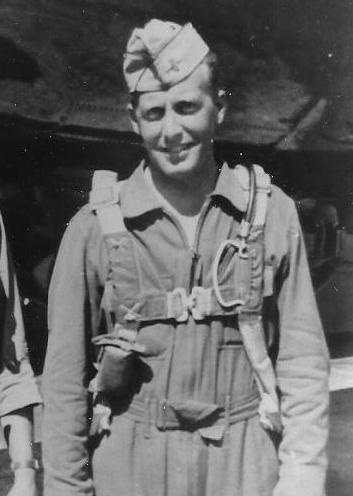

Commander 1st Lt. Warren Neal. Crew photo: Back: Rushing, Lutzhoff, Neal, Roach, Imperatore. Front: Owen, Johnson, Noack.
—–
Rumors had started about “peacetime conversion,” and the strongest were that this crew would be going over on patrol duty or transporting cargo and men back. B-29s could be used for either.
Crew 23, Biggs Field, El Paso, Texas, August 1945
[image error]Back: 2Lt. Thomas A. Owen (bombardier), (?) F/O William L. Noack (copilot) , F/O Imperatore (navigator), (?) F/O Johnson (engineer), (?) PFC Burl Roach (tail gunner). Front: 1st Lt. Warren Neal (commader), Sgt. E.D. Lutzhoff (radio operator), Cpl. Tommie D. Rushing, Jr. (right scanner). Awaiting one more crew member.
Warren knew shortly after they got to Biggs Field where they would have been stationed, type of missions, etc. They were the first class of “special crews,” all trained to be the lead crews in combat. “Single night missions with 29’s stripped of all guns except the tail turret. Depending on speed for safety rather than guns.” He said it wouldn’t have been as bad as it sounded since no U.S. fighter could catch a B-29 at 30,000 feet. But he’d been afraid Doris would worry about it if he’d told her before.
August 2, B-29s dropped 6600 tons of incendiaries on Japan.
August 6, an atomic bomb was dropped on Hiroshima, Japan.
August 9, another atomic bomb was dropped, this time on Nagaskai. Warren’s brother-in-law, Junior Wilson, was killed in a training accident in Texas. He was not allowed to go home for the funeral, as Japan still had not surrendered.
Friday, August 10, Warren’s crew soloed in a B-29 for the first time, airborne for seven hours. No word about surrendering from Japan.
The day of Junior’s funeral in Iowa, August 14, Japan finally agreed to surrender. VJ-Day, or Victory over Japan, was the next day.
Warren Neal: B-29 Superfortress Commander
The B-29 was a long-range heavy bomber, designed to carry huge loads long distances. It was used entirely against Japan in WW II because it was the only heavy bomber able to reach Japan–across the Himalayas from India and from islands in the Pacific.
Boeing proposed the plane to the Army in 1940. Technologically advanced, it had remote control guns. Two crew areas–front and back–were pressurized and connected by a long tube over the bomb bays, allowing crew members to crawl between them. The tail gunner’s area was also pressurized.
[image error]
My dad, Warren Neal, was an Iowa farmer who became a pilot during WWII. Born in 1917, he was a little older than other cadets, and was asked to be an Advanced Instructor after earning his wings at Marfa Army Air Base, Texas. In December of 1944, the first B-29 landed at Marfa. “A person can’t realize that they can get so much iron and steel off the ground,” he wrote. He said that the brakes smoked to get the Superfort stopped before the 1 ¼-mile runway ran out. People ran out to see it before the huge plane was parked.
After Pacific islands were captured by the U.S., near enough to Japan to reach it by long-range bombers, we set to work building runways. Hundreds of B-29s were sent to Gram, Tinian, and Saipan as quickly as possible.
With the war in Europe winding down, Advanced Instructors were eyed as B-29 pilots. Men with over 1000 hours of flight were mainly sent to multi-engine training, at first in B-17s, returning from combat in Europe.
Warren was ordered to Biggs Field, El Paso, Texas, to train. His first time up in a B-29 was July 19, 1945. Training missions were at least seven hours, as combat missions would be long ones. “Sure is a big clumsy brute,” he wrote his wife Doris.

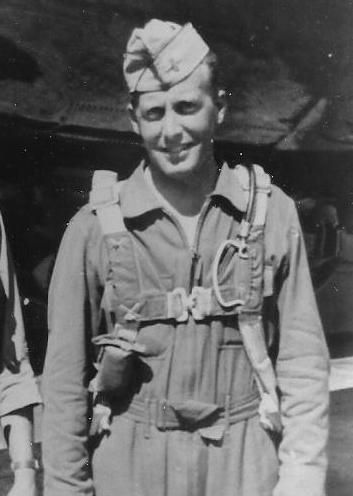
A Superfortress was like a military command where they all had to work as a team. Each crew member had his own specific coordinated functions. Even before getting into the plane, the crew lined up for a formal inspection by the commander, as he was responsible for the performance of his entire crew.
The biggest job was getting it pre-flighted. And from the cockpit–fifteen feet ahead of the wings–they couldn’t see the wheels or the flaps, so needed to “scanners” in the back who told him over the interphone their positions. They were short of planes, so just kept the crews on the flight-line to be ready whenever a plane would return.
The commander, copilot, and bombardier worked in the forward flight deck, with the navigator behind the commander. A ladder behind the navigator led to a crawl space above the bomb bays to reach the other stations. The rest of the nine- to ten-member crew were the engineer, radio operator, tail gunner, and two gunner-scanners.
[image error]B-29 Crew 23, Biggs Field, El Paso, Texas, 1945. Front: Commander 1st Lt. Warren Neal, Radio Operator Sgt. E. Bayard Lutzhoff, Right Scanner Cpl. Tommie Rushing. Back: Bombardier 2nd Lt. Thomas Owen, Jr., Copilot F/O William Noack, Navigator F/O Arthur Impertore, Engineer F/O Lacy Johnson, Left Scanner Cpl. Russell Sanders, Tail Gunner PFC Burl Roach.
The crews had to report to the flightline at 4:00 in the morning. “Give me the good old farm where you don’t have to get up until 4:30,” Warren wrote.
Warren told Doris not to worry about him, “as a B-29 will float for days, even weeks if a good landing is made on water.” He called his plane the “big iron bird.”
B-29 Superfortresses were mainly used in the Pacific, with as many as 1,000 at a time bombing Tokyo, destroying large parts of the city.
August 6, 1945, the B-29 Enola Gay dropped an atomic (uranium) bomb on Hiroshima, Japan. The next day more B-29s raided Japan, but there was still no talk of surrender. August 9, the B-29 Bockscar dropped another atomic bomb (plutonium) on Nagasaki.
Orders for Warren’s crew were to leave for combat staging September 18–to make long single plane night raids over Japan from Saipan. The atomic bombs meant that probably they wouldn’t see combat, but instead would be part of the army of occupation.
[image error]B-26 landing on Saipan, December 1944. Thankful the war ended before Dad ended up there.
Doris’s youngest brother was killed in Transition Training the morning the second atomic bomb was dropped. Warren was not allowed to come back for the funeral. Doris, afraid her brother had waited too long before trying to bail out of the plane, told Warren that–if anything went wrong with his plane–to jump quick.
Warren answered not to worry about him, that he wouldn’t hesitate to get out. “I keep the boys reminded all the time that when I say ‘go,’ we go and fast, because they can build more 29’s.”
Waiting and wondering and hoping for the war’s end were nerve wracking for the crews. Their departure day was extended to September 21. Training schedules went on as before, just shortened flying hours. There was talk about “peacetime conversion,” and the strongest rumors were that they would be going over on patrol duty or transporting cargo and men back. B-29s could be used for either.
In his August 18 letter, he said that they knew shortly after they got there where they would have been stationed, type of missions, etc. They were the first class of “special crews,” all trained to be the lead crews in combat. “Single night missions with 29’s stripped of all guns except the tail turret. Depending on speed for safety rather than guns.” He said it wouldn’t have been as bad as it sounded since no U.S. fighter could catch a B-29 at 30,000 feet. But he’d been afraid Doris would worry about it if he’d told her before.
Now they were to finish up as regular crews, Warren wrote Doris, with turret ship and a central fire control gunner, which they hadn’t had before. And it called for formation practice, which they hadn’t had yet in the B-29. By the end of August, they were told that they would be going overseas as a Bomb Group replacement, gone not longer than a year and a half.
But by the end of September, Warren was back in Iowa and out of the Army Air Force, having logged 54 hours in a B-29 Superfortress within two months.
Fifi
Dad was right. You can’t see the wings from the commander’s cockpit. Mom never got to see Dad fly a Superfort, but Mom, Gloria, and I visited Fifi, then the only airworthy B-29, at the Mason City Airport in 1991. We drove up the day before to watch it land. It was already there. What a disappointment.
[image error]
It came up that I was doing some writing about WWII. The man in charge said, “I tell you what–if you want to come back up the day we leave, you can fly with us to Grand Rapids, but you’ll have to get your own ride home from there.”
I never did get a ride in the B-29, but all three of us did climb up into the cockpit and took turns taking each other’s pictures in the commander’s seat.
[image error]Mom in the commander’s seat, Mason City, Iowa, August 6, 1991.
[image error]Me, Mom, Gloria–August 6, 1991, Mason City, Iowa.
Fifi taking off from Dallas Executive Airport, 2014.
1945 film “Birth of the B-29 Superfortress”
July 14, 2020
Flight 232: A Story of Disaster and Survival
by Laurence Gonzales
The Book
As hundreds of rescue workers waited on the ground, United Airlines Flight 232 wallowed drunkenly over the bluffs northwest of Sioux City. The plane slammed onto the runway and burst into a vast fireball. The rescuers didn’t move at first: nobody could possibly survive that crash. And then people began emerging from the summer corn that lined the runways. Miraculously, 184 of 296 passengers lived.
No one has ever attempted the complete reconstruction of a crash of this magnitude. Drawing on interviews with hundreds of survivors, crew, and airport and rescue personnel, Laurence Gonzales, a commercial pilot himself, captures, minute by minute, the harrowing journey of pilots flying a plane with no controls and flight attendants keeping their calm in the face of certain death. He plumbs the hearts and minds of passengers as they pray, bargain with God, plot their strategies for survival, and sacrifice themselves to save others.
Ultimately he takes us, step by step, through the gripping scientific detective work in super-secret labs to dive into the heart of a flaw smaller than a grain of rice that shows what brought the aircraft down.
An unforgettable drama of the triumph of heroism over tragedy and human ingenuity over technological breakdown, Flight 232 is a masterpiece in the tradition of the greatest aviation stories ever told.
[image error]
My Thoughts
A tiny pit, a cavity, a fatal flaw
Flight 232 is a remarkable and intensive story of the astonishing crash of a DC-10 at Sioux City, Iowa, on July 19, 1898. That anyone survived is a miracle. You meet the crew and passengers–in striking detail–before, during, and after the devastation. The author even painstakingly interviewed them decades later, after they’d sorted memories and how it affected their lives afterwards. Remarkable also was the way streams of prepared rescuers and experts zeroed in to Sioux City to help, to rush survivors to the hospital, to set up a morgue, to begin trying to discover just what had happened.
How things were handled that day, and days after, have influenced today’s disaster response plans. The author even followed the metallurgical path of the titanium that ultimately was the source of the tiny flaw which caused the calamity. A fitting tribute to a shocking corner of history.
My husband, a retired air traffic controller, also recommends this “story of disaster and survival.”
July 10, 2020
Donald Wilson Serves on Famed Hancock
Perry, Iowa
July 10, 1945
From: The Perry Daily Chief
Donald Wilson Serves on Famed Hancock
Aboard the aircraft carrier U.S.S. Hancock in the Western Pacific, Donald Wilson, chief electrician’s mate, U.S.N., son of Mr. and Mrs. C.D. Wilson, Route 2, Perry, Iowa, shared this carrier’s unequaled one-day record of 71 enemy aircraft shot down, 19 probably downed, 8 destroyed, and 12 damaged on the ground, during a raid over the Tokyo area on Feb. [16], 1945.
Before this performance, the U.S.S. Hancock gained fame by bombarding Okinawa for eight straight days, during which the record of 600 individual plane strikes was set. The result was 10 ships sunk, including three attack transports, a sub tender, and a large tanker, with 22 Japanese aircraft and industrial and chemical plants destroyed.
Commissioned a little more than a year ago, the carrier took part in operations off Samar, supported the Leyte invasion, attacked shipping in the South China Sea, and provided air support for the Iwo Jima campaign.
In 190 strikes by the Hancock, she accounted for nine warships, 32 merchant ships, 241 enemy planes, and an indefinite number of aircraft destroyed on the ground.
Each crewman has eight solid pages of battle actions and commendations entered in his service record.
Wilson, who is 28, has been in the Navy since 1934 and served aboard the carrier Yorktown until she was sunk. His last visit home was in June of 1943.
Wilson has four brothers also in service—Delbert is an electrician’s mate first class in the Navy; Dale and Danny are second lieutenants in the Army Air Force; and Junior is a flight officer in the Air Corps.
A brother-in-law, Lt. Warren D. Neal, is taking B-29 training.
[image error]
That same day, a U.S. Navy Task Force, which included Don’s carrier, launched 1000 aircraft against Tokyo airfields.
A few days later, the carrier was part of another 1000-aircraft strike on airfields and shipping on Hokkaido. The Japanese had mined around their islands, and their submarines were also a serious threat.
July 8, 2020
P-38 Lighting: Unforgettable Missions of Skill and Luck
[image error]The Book
The P-38 National Association wants to put YOU in the cockpit of the greatest combat airplane of World War II with remembrances of the P-38 Lightning as told by the people who were there. Compiled from the archives of the P-38 National Association membership publication, “Lightning Strikes,” this book contains some of the most dramatic, heart-wrenching and humorous stories as told by the combat pilots, ground crews and other personnel who had hands-on experiences with the P-38 Lightning.
Included in the book are numerous historical photos of the personnel and the plane along with tales of bravery and humor which took place before, during and after the war. The book also includes stories about the design, development and production of the P-38.
The Authors
Compiled and edited by noted aviation author, historian and “Lightning Strikes” editor Steve Blake and author and historian Dayle DeBry. Introduction by P-38 National Association President Bob Alvis.
My Thoughts
I’ve been a member of the P-38 National Association for decades, so learned about this book as soon as it was available. It’s dedicated to all World War II veterans and their families, and to the pilots and crews of the P-38 Lightning who proudly served their country and left a legacy for us to continue and uphold.
Chapter One details the design, development, productions, and modifications of the fighter plane. Chapter Two includes stories of the P-38 stateside.
Chapters Three through Six tell about each theater of operations the Lightning served in: Pacific, China-Burma-India, Mediterranean, and European. Italy was included in the Mediterranean ETO so I was especially interested in it, since one of Iowa’s Wilson brothers was based there with the 15th AF, 14th FG, 37th Fighter Squadron. (He was lost on a mission in Austria February 19, 1945.)
Chapter Seven gives the history of the plane after the war, and Chapter Eight includes miscellaneous Lightning Stories.
The book is thoroughly entertaining, from experimenting with landings and takeoffs with retractable skis, to well-known pilots (Charles Lindbergh, ace Dick Bong, even General Jimmie Doolittle).
It told about each layer of clothing needed for high-altitude escort missions, which I took note of because Danny Wilson sent home photos of himself bundled up.





